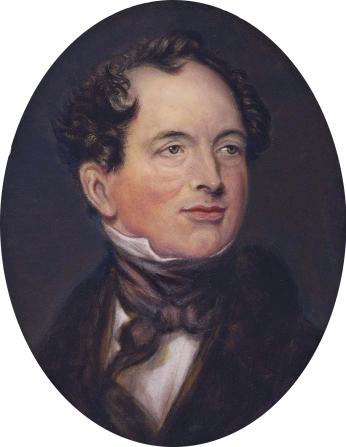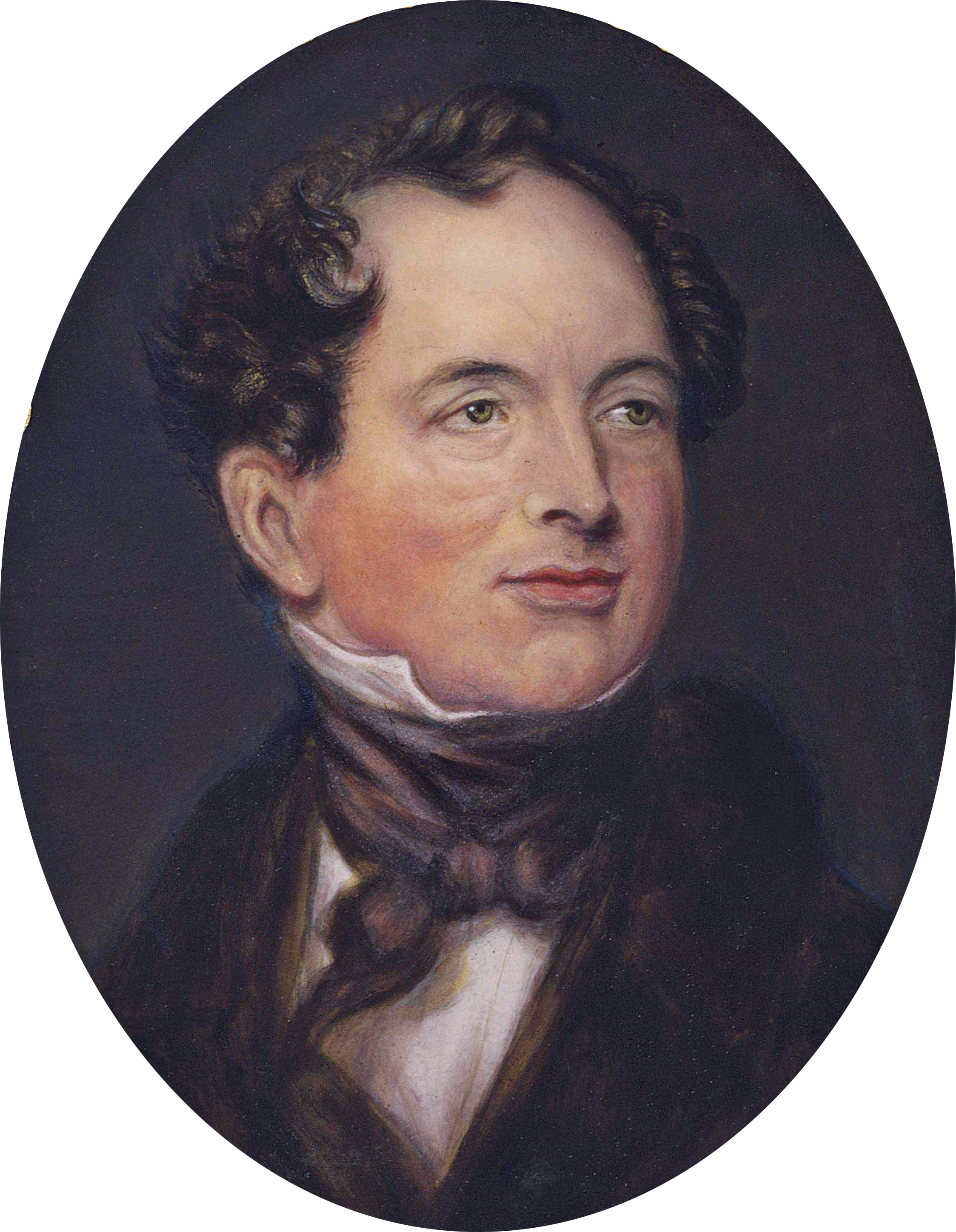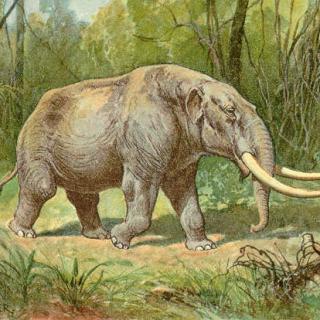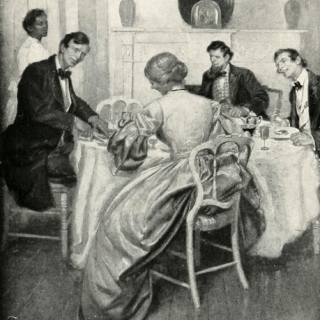Ireland's National Poet Visits Washington, 1803
In the wilderness of early Washington, fancy hotels and salons were not yet available for the stars of the city to gather. Instead, prominent citizens gathered in a farmer’s cottage to “discuss crops and drink apple jack.”[1] In 1803, an Irish celebrity joined them around the fire, and immortalized the scenery in verse.
Thomas Moore, born in Dublin in 1779, was only at the beginning of his fame when he visited the capital. He would go on to publish the songbook Irish Melodies, which sold over 1.5 million copies in America and was held in the hearts of Irish immigrants.[2] In England, he was essentially a rockstar; he received countless love letters and his was highly prized as a romantic keepsake.[3] He is remembered today as the National Poet of Ireland.
His life was not without controversy, however. Not only did he burn Byron’s memoir, he also formed an dislike for America while here, especially Thomas Jefferson, who reportedly mistook the short poet for a child.[4] Oops.
We can probably therefore assume that the following poem was written fairly early in his stay here. Moore gushes about the beauty of Washington and cannot seem to heap enough praise on the view. However, don’t give him too much credit, as his views on the natives are… pretty gross. Read on to form your own opinion.
To Thomas Hume, esq., M.D. from the City of Washington.
‘Tis evening now; the heats and cares of day
In Twilight dews are calmly wept away.
The lover now, beneath the western star,
Sighs through the medium of his sweet cigar,
And fills the ears of some consenting she
With puffs and vows, with smoke and constancy!
In fancy now, beneath the twilight gloom,
Come, let me lead thee o’er this modern Rome!
Where tribunes rule, where dusky Davi bow,
And what was Goose-Creek once is Tiber now!
This famed metropolis, where fancy sees
Squares in morasses, obelisks in trees;
Which travelling fools and gazetteers adorn
With shrines unbuilt and heroes yet unborn.
And look, how soft in yonder radiant wave,
The dying sun prepares his golden grave!
O great Potomac! O you banks of shade!
You mighty scenes, in nature’s morning made,
while, still, in rich magnificence of prime,
She pour’d her wonders, lavishly sublime,
Nor yet had learn’d to stoop, with humbler care,
From grand to soft, from wonderful to fair!
Say were your towering hills, your boundless floods,
Your rich savannas and majestic woods,
Where bards should meditate and heroes rove,
And woman charm and man deserve her love!
Oh I was a world so bright but born to grace
It’s own half-organised, half-minded race
Of weak barbarians, swarming o’er its breast,
like vermin, gender’d on the lion’s crest?
Where none but brutes to call that soil their home,
Where none but demigods should dare to roam?
Or worse, thou mighty world! oh! doubly worse,
Did Heaven design the lordly land to nurse,
The motley dregs of every distant clime,
Each blast of anarchy and taint of crime,
Which Europe shakes from her perturbed sphere
In full malignity to rankle here?
But hush! - observe that little mount of pines,
Where the breeze murmurs and the fire-fly shines,
there let thy fancy raise, in bold relief,
The sculptured image of that veteran chief,
Who lost the rebel’s in the hero’s name,
And stepp’d o’er prostrate loyalty to fame;
Beneath whose sword Columbia’s patriot train
Cast off their monarch, that their mob might reign!
How shall we rank thee upon glory’s page?
thou more than soldier and just less than sage!
too form’d for peace to act a conqueror’s part,
too train’d in camps to learn a statesman’s art,
Nature design’d thee for a hero’s mould,
But, ere she cast thee, let the stuff grow cold.
While the warmer souls command, nay, make their fate,
thy fate made thee and forced thee to be great,
yet fortune, who so oft, so blindly sheds
Her brightest halo round the weakest heads,
Found thee undazzled, tranquil as before,
Proud to be useful, scorning to be more;
Less prompt at glory’s than at duty’s claim,
Renown the meed, but self-applause the aim;
All thou has been reflects less fame on thee,
Far less than all thou hast forborne to be!
Now turn thine eye where faint the moonlight falls
on yonder dome- and in those princely halls,
If thou cast hate, as, oh! that soul must hate,
Which loves tje virtuous and reveres the great,
If thou canst loath and execrate with me
That Gallic garbage of philosophy,
That nauseous slaver of these frantic times,
With which false liberty dilutes her crimes!
If thou hast got, within thy free-born breast,
one pulse that beats more proudly than the rest,
With honest scorn for that inglorious soul,
Which creeps and winds beneath a mob’s control,
Which courts the rabble’s smile, the rabble’s nod,
And makes, like Egypt, every beast its god!
there, in those walls- but, burning tongue, forbear!
Rank must be reverenced,
even the rank that’s there;
So here I pause- and now, my Hume! we part;
But oh! full oft, in magic dreams of heart,
thus let us meet, and mingle converse dear
By Thames at home, or by Potomac here!
O’er lake and marsh, through fevers and through fogs,
Midst bears and yankees, democrats and frogs,
They foot shall follow me, thy heart and eyes
With me shall wonder, and with me despise!
While I, as oft, in witching thought shall rove
To thee, to friendship, and that land I love,
Where like the air that fans her fields of green,
Her freedom spreads, unfever’d and serene;
Where sovereign man can condescend to see
The throne and laws more sovereign still than he!
Source: The Works of Thomas Moore: Comprehending All His Melodies, Ballads, Etc. Never Before Published Without the Accopanying Music, Vol. II (Paris: A and W Galignani, 1823).
Footnotes
- ^ Washington, DC: A Turn of the Century Treasury. Ed. Frank Oppel and Tony Meisel. (Castle: 1987).
- ^ “People and Events: Thomas Moore, 1779-1852.” American Experience, PBS.org.
- ^ Hoffman, Miles. Interview by Renee Montagne. “The Irish Melodies of Poet Thomas Moore.” Morning Edition. NPR.
- ^ Kelly, Ronan: Bard of Erin. The Life of Thomas Moore (Dublin: Penguin Ireland, 2008)







![Sketch of the mythical fuan by Pearson Scott Foresman. [Source: Wikipedia]](/sites/default/files/styles/crop_320x320/public/2023-10/Goatman_Wikipedia_Faun_2_%28PSF%29.png?h=64a074ff&itok=C9Qh-PE1)












